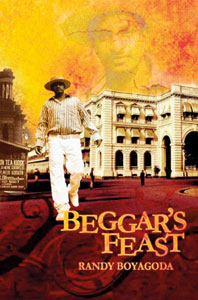Beggar’s Feast is a rags-to-riches picaresque about the clash of worlds and the revenge of empires, about fate and history and harbours and birthright and moneylenders and metal-benders.
Our main character in this sprawling novel is Sam Kandy, born in a tiny village in what was Ceylon; his strange odyssey to affluence and power touches down in Australia, Singapore and Sri Lanka, spanning three marriages and many families, city and country, and all of the 20th century.
The easy postcolonial comparison might be Rushdie or Ondaatje, but Sam Kandy, the inventive and ambitious scrabbler, also has a bit of Saul Bellow’s Augie March, while his humble beginnings (“a no one from nowhere”), his invented name, his climb to money and manners and motorcars and English suits and silver cigarette cases remind me of that other signifying cipher upstart, Jay Gatsby.
Like all such literary characters and social climbers and magnates, Sam Kandy is not always sympathetic; he can coldly flee connections and wives and sons and daughters, or leave his driver to be beaten to death by a May Day mob, but there is something endearing about the cad. Should we worry about liking such a figure, a Trump, a Madoff? Or does a writer simply report what is there, as if showing a force of nature, a monsoon or a killer wave looming over the supporting characters?
Indeed, the cast of Beggar’s Feast is huge, but Boyagoda, a sharp and subtle writer, slips easily into many different characters’ heads and their internal rhythms, and lyrical lines abound: the quartz-coloured eyes of woken dogs in headlights; the translucent furze of crushed insect wings on headlamps; women’s laced throats arching in wonder at the long shadow of the new bell tower; flowers made yellow beneath a light that looked like a giant drop of perfect water; an older woman described as a birdcage wrapped in a bed sheet.
The scenes of stowaways and refugees and diasporas and shadow lives are timely, with Tamil refugees in Canadian headlines and Italy divided dealing with waves of migrants from all sides. In a strange scene during the Second World War, Kandy is summoned to the docks of Colombo by Lord Mountbatten to take possession of six Ethiopian prisoners with padlocks through their lips, and Kandy hides them in his village.Kandy grows fat on war spoils and overflowing dockside warehouses, but after the war he falls from grace, his empire declines, and he seems powerless to alter his fate, despite all he has made and possessed in his life.
Beggar’s Feast is a book very much concerned with fate and birth and free will, an almost Elizabethan fixation with “jurying stars” and “blood and birth hour” and the “rock-face logic of blood and stars and caste.” Can beggars choose their fates? Perhaps in rare cases, but for most, the die is cast at birth by caste, class and colour.
The last chapters of Beggar’s Feast are less weighty; in fact, they are upbeat and farcically hilarious. Toward the end of his life, Sam Kandy’s traditional village becomes a Disney-like tourist attraction, playing at being a village. “Villagers not selected to be villagers became ticket takers and staffed the refreshment stand.” White swimming trunks are imported because the locals refuse to wear loincloths, hidden cassettes provide background music because the advising folk-culture professor thinks the local tabla men do not rate. Tourist cameras snap like grasshoppers at “history and memory conveniently located and reasonably priced.” Malice and grudges and black deeds and poison are not evident in this model village; no weeds in this garden of the world.
These ending parts are very funny and the book takes on a totally different feel. Sam Kandy relaxes and seems redeemed by his third wife, the loving Rose, and their 14 children, and the book, too, which might have seemed very serious, is redeemed as well, made into a satirical feast.
Randy Boyagoda is a featured author of the 2012 Galle Literary Festival and this is his latest novel.
Mark Anthony Jarman writes this from Ireland. His most recent book is My White Planet. |


